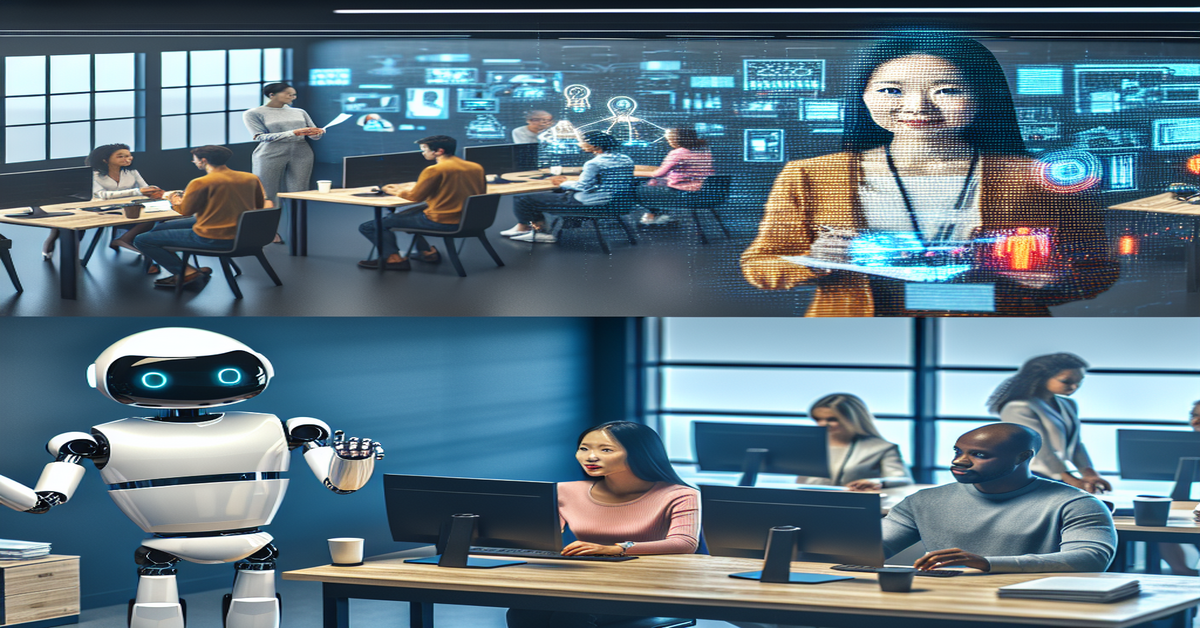The Risks of Overreliance on AI in the Workplace: Striking a Balance for Critical Thinking
In today’s rapidly evolving business landscape, Artificial Intelligence (AI) has become an integral part of many organizations’ workflows. From automating repetitive tasks to providing data-driven insights, AI has the potential to revolutionize the way we work. However, a recent study sheds light on the potential risks associated with an overreliance on AI in the workplace, particularly its impact on critical thinking skills.
The Decline of Critical Thinking
The study, conducted by a team of researchers, suggests that **excessive reliance on AI** can lead to a decline in critical thinking skills among employees. When workers depend too heavily on AI tools for decision-making and problem-solving, they may not engage their own critical thinking abilities as frequently. This can have significant implications for the long-term development and retention of these essential skills.
The Atrophy of Skills
Over time, the reduced engagement in critical thinking can result in the **atrophy of these skills**. Just like muscles that aren’t exercised regularly, critical thinking abilities can weaken if they aren’t consistently utilized. This means that employees who rely too heavily on AI may become less capable of handling complex or unexpected situations that require human judgment and reasoning.
The researchers warn that this skill atrophy can have far-reaching consequences. In a rapidly changing business environment, the ability to think critically, adapt to new challenges, and make sound decisions is crucial. If employees lose these skills due to an overreliance on AI, it can hinder their personal growth and limit their potential to contribute to the organization’s success.
The Dangers of Dependency
While AI can be a powerful tool for efficiency and accuracy, the study emphasizes the importance of using it judiciously. When AI becomes the go-to solution for every problem, it can create a culture of dependency within the workplace. Employees may begin to view AI as a crutch, relying on it even for tasks that require human intuition and creativity.
This dependency can have several negative consequences. First, it can lead to a lack of initiative and problem-solving skills among employees. If workers become accustomed to AI providing all the answers, they may struggle when faced with situations that require independent thinking and decision-making.
Second, an overreliance on AI can create a false sense of security. While AI algorithms can process vast amounts of data and generate insights, they are not infallible. They can be subject to biases, errors, and limitations. If employees blindly trust AI without applying their own critical thinking, they may overlook potential flaws or make decisions based on incomplete or inaccurate information.
Finding the Right Balance
The researchers advocate for a balanced approach to AI integration in the workplace. Rather than replacing human decision-making entirely, AI should be used to **support and enhance** it. This means leveraging AI tools to streamline processes, provide valuable insights, and assist with complex calculations while still empowering employees to apply their critical thinking skills.
Organizations should foster a culture that values and encourages critical thinking alongside the use of AI. This can be achieved through training programs that focus on developing these skills, as well as by creating opportunities for employees to engage in problem-solving and decision-making exercises that require human judgment.
Implications for Workforce Development
The findings of this study have significant implications for workforce development and training initiatives. As AI becomes more prevalent in the workplace, employers must prioritize the development of critical thinking skills among their employees.
This may involve incorporating specific training modules that focus on critical thinking, problem-solving, and decision-making. These programs should provide employees with the tools and frameworks needed to analyze information, ask critical questions, and make informed decisions.
Additionally, organizations should encourage a culture of continuous learning and development. As AI technologies evolve, employees must be equipped with the skills to adapt and leverage these tools effectively. Regular training and upskilling initiatives can help employees stay ahead of the curve and maintain their critical thinking abilities in an AI-driven work environment.
Conclusion
The study on the potential risks of AI overreliance in the workplace serves as a valuable reminder of the importance of maintaining a balance between technology and human skills. While AI can bring tremendous benefits in terms of efficiency and accuracy, it should not come at the cost of critical thinking abilities.
As we navigate the future of work, it is essential for organizations to prioritize the development and preservation of critical thinking skills among their employees. By striking the right balance between AI and human judgment, we can harness the power of technology while ensuring that our workforce remains agile, adaptable, and capable of tackling the challenges of tomorrow.
#ArtificialIntelligence #CriticalThinking #WorkplaceDevelopment
-> Original article and inspiration provided by BW Businessworld
-> Connect with one of our AI Strategists today at Opahl Technologies


